#Window frame indian
Explore tagged Tumblr posts
Text
Eclectic Furniture Decor Design
An old colonial home with a refined taste and a hint of nonchalant vintage charm. Blending old rustic patina doors and fresh clean lines, a mix of antique and modern, results in an exceptional curated home that is stunningly eclectic and beautiful. Renovating an old Spanish 19020s home completely inside out, yet preserving every original detail such that the character of the home stays unchanged…
#handmade#Indian vintage window#Indian wooden window#Interior Design#Jaipur window#old door headboard#old door table#old doors#old vintage door#reclaimed wood#Rustic Barn Doors#rustic carved#rustic carved door#rustic doors#rustic farmhouse doors#rustic sideboard#sideboard buffets#Sideboards#sideboards and consoles#sliding barn doors#statement doors#Tradition window#tree of life door#Vintage Indian antiques doors#vintage rustic door#whitewash sideboard#Window frame indian#Wooden antique window
0 notes
Photo

Bathroom Charlotte With a vessel sink, furniture-style cabinets, black cabinets, wood countertops, red walls, and red countertops, this powder room has a small rustic, medium-tone wood floor.
1 note
·
View note
Text
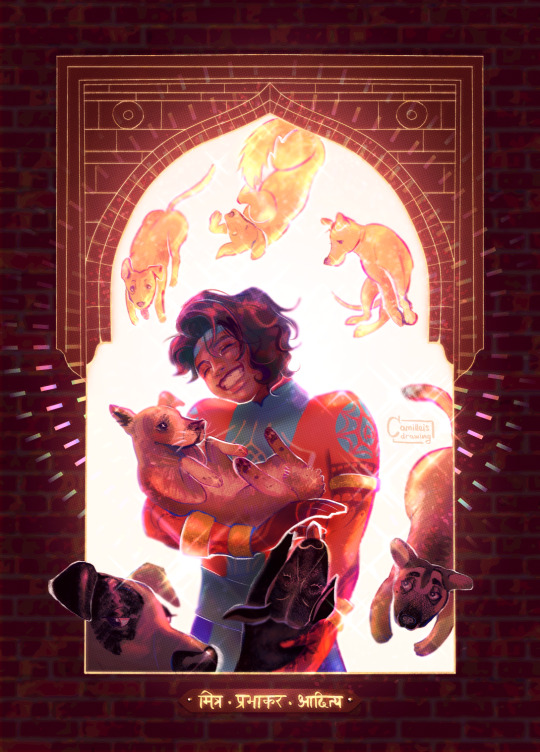
The luminous friend(s) of humankind ☀️
[ ID: An Indian-style arch window made of brick frames the scene. Pavitr, wearing his Spider-Verse costume, smiles with his teeth so widely that his eyes are closed. He is carrying a dog with his arm and playing with another dog on its hind legs seeking to lick and hug him. Another dog side-eyes the audience, other dogs are magically floating in the air. There are seven stray dogs in total. Bright sunlight shines behind them all like a halo. The golden Sanskrit Devanāgari script written on the plaque at the bottom of the frame writes: Mitra - Prabhākara - āditya [ मित्र - प्रभाकर - आदित्य -- literally, 'friend - light-maker - son of Aditi, the goddess of the cosmos']. They are the aliases of the Hindu sun god Sūrya who mounts a chariot drawn by seven horses. End ID]
#camilleisdrawing#digital art#fanart#digital illustration#digital painting#spiderverse fanart#spiderverse#across the spider verse fanart#across the spiderverse#atsv#atsv fanart#pavitr prabhakar#spider verse#spiderman india#hope my sanskrit professors are proud of me#U_U b
800 notes
·
View notes
Note
Okay imagine Matt’s gf being REALLY clumsy, like to the point where he is telling her to watch out for the couch or the counter, etc, as he knows where his furniture is placed and he can hear where she’s walking… Like he’s like, “Y/n, watch out for the-“ Then an “OUCH” follows 🤣🤣 Him catching her when she trips and her cheekily saying, “nice catch” and he cheekily says back “nice fall”🤣🤣🤣🤣
hii my sweet, I just realised that I didn’t actually include the dialogue you said IM really SORRY, but the tone of it is the same. thank you for requesting, hope you like it💌
klutz
Matt Murdock x fem!reader
wc || 0.4k
warnings || none
masterlist + rules
taglist
You were spending the day at your boyfriend’s apartment, helping him do up his place; spending many hours patching up holes and filling cracks. Matt didn’t want to hire someone, so you kindly offered to do it. You weren’t qualified, not even a little, but Matt needed the help. Right now you were glad he couldn’t see because you did a shocking job of filling the holes in the walls.
“I think it looks good.” You lie, putting your hands on your hips. Wobbling on the chair at the lack of balance.
“Be careful up there, yeah?” He sweetly warns, rushing over to hold your waist to keep you still.
“All good. Right, so… the wall is filled…at least?” Your tone rising, trying to find a positive in the awful work you had done. Laughing to yourself, stepping down from the chair with thanks to Matt’s chivalry.
“What else needs doing?” You ask, looking around his apartment. “What about that crack in the silicone by the window- you’ll get cold.”
“You’re not even qualified.” He chuckles earnestly, moving the chair to the side.
“Um- I am now… I watched lots of tutorials.” You snicker, collecting your makeshift toolbox from the coffee table, and picking out old tools you found at a thrift store.
“By the way-“ Matt starts, your screech cutting him off.
“Yep- thanks.” You groan, rubbing over your knee. Moving the chair to the side, again.
“Can you help me move these instead?” Matt asks, nodding to the piles of flat-pack furniture by the door.
“Of course.” Jokingly flexing your arms. “Look at that… daredevil? Needing my help?”
“Don’t get used to it.” He jokes, carrying a couple of boxes into his room.
Picking up a piece with great amounts of effort, straining as you moved it into the bedroom. “Watch out, watch out.” You groan, walking faster so you could let go of it quicker. “Oh my…” noticing Matt’s stern look, “…crud.” Desperately shaking your hands.
He returns with the next stack, piling it against the wall. “I’ll sort that out another time.” Walking away from his new flatpack bed frame.
“What do you want for dinner? I’m gonna order.” Pulling out your phone to follow Matt into the living room.
“Box.” Matt states indifferently, slumping into the couch.
Whacking your ankle on the corner as you walk past, grumbling at a new patch of skin that’s soon to form another new bruise.
“I know.” You whine, flopping beside him.
“Give it here.” He says sweetly, lifting your foot up to place a delicate kiss on your ankle. Twisting you around so your legs could drape over him. “Indian food?” Matt asks with a smile. “My treat- for all your hard labour today.” Chuckling genuinely.
“I thought you were paying.” Returning a grin.

#matt murdock#matt murdock x you#matt murdock x reader#matt murdock imagine#matt murdock fanfic#matt murdock fluff#matt murdock blurb#matt murdock x fem!reader#matthew murdock#matthew murdock x you#matthew murdock x reader#matthew murdock fanfiction
320 notes
·
View notes
Text

[ID: Digital painting of Jon and Martin from TMA. Jon is a thin British-Indian man with long, curly, silver hair, and many scars across his face, neck, and hands. He wears an oversized, faded red jumper, and his glasses rest on top of a book on the table in front of him. Martin is a fat non-op trans man with greying brown hair and slightly unnaturally pale skin. He wears an open orange button-up short-sleeved shirt over a mint green half-binder, and holds his glasses in one hand. The two of them are leaning forward across a breakfast table to kiss, Jon gently holding one of Martin's arms, and Martin cupping Jon's face in his other hand. On the table are two mugs: a yellow one with various cats, aand a blue one with a two-tone drip effect and mushrooms on the bottom half. Framing them is an abstract orange shape, overlaid with a Magnus Institute ID badge, a boarding pass, a teabag, a highland cow with its calf, a red corded phone receiver, a corkscrew with Prentiss worms, a butter knife, two spiders, a bloodied hunting knife, and a cassette tape, the insides of which have unspooled and are curled around the other items, making up the web of one of the spiders. Behind Jon and Martin is a warm brown room with two windows, both looking out onto rolling green hills and a cloudless sunrise. End ID.]
i feel very normal about the concept of ephemerality (<- lying. lying as in deceiving but also lying as in prone on the floor)
#tma#the magnus archives#magpod#jonmartin#jmart#jon sims#martin blackwood#tma art#tma spoilers#my#saint draws#blades#spiders#bugs#blood#i have been poking at this all week but i wanted to try to get some writing done before classes start back so. here u go#<3
178 notes
·
View notes
Note
Driving past a graveyard on a lonesome street

I can't stop thinking of how deranged he looks in this gif
Every Christmas Eve Harm visits the Vietnam War Memorial. He sets a small bouquet of flowers down against the glossy wall before he presses his fingertips to his father’s name and tells him he’s thinking of him.
This year it’s you that goes to the memorial, you that leaves the flowers, you that runs your fingers over the engraving before you tell Harmon Rabb Snr his son is thinking about him somewhere in the Indian Ocean.
“I appreciate you taking the time to do that for me.” Harm tells you over the phone later that evening, the line crackling like crazy and you have to strain your ears to hear the even timbre of his voice.
“You don’t have to thank me.” You say softly as you roll the sleeves of the sweater you’re wearing up to your elbows. It’s one of Harm’s, his white one, the scent of his aftershave still clings to the woollen collar as you pull it up just a little higher. “I know how important it is for you.”
This is the first time in over a decade he hasn’t attended the memorial and it weighs heavily on his shoulders. The last time he was in Russia visiting his brother Sergi. The two of them had toasted to their father instead with gold leaf vodka that Sergi had bought especially for the occasion.
“I’m sorry.” He says quietly. “About not being there for Christmas.”
It’ll be the first one the two of you have been apart for in your time together. You’ve developed your own traditions over the years. Usually after the memorial you curl up on the couch with Harm’s homemade hot chocolate and watch ‘It’s A Wonderful Life’ his choice, followed by your choice ‘Elf’ and then the joint choice ‘Die Hard’.
Christmas morning is usually spent with Harm in the kitchen, it’s his favourite place in the house. He treats cooking as a form of creative expression and you always reap the benefits with delicious meals he makes. You’d had the kitchen renovated when you’d first moved in so that the worksurfaces fit his 6’4 frame. When Harm was docked in Naples he’d fallen in love with rustic Italian influences, that’s the way the kitchen has been designed. It’s a bright, airy space with wooden cabinets, a steam oven, a stove and indoor gas grill. The dishware came over with him from Perugia, the glassware from Murano. The kitchen table where you share meals is French country, a vintage piece he’d had shipped from a market in England.
When you’re missing him you sit at the kitchen table with your laptop because being in his space amongst these things makes you feel close to him.
“There’ll be other Christmases.” You remind him as you cradle the phone under your chin tucking the couch blanket around your legs. “Besides it’s not like I’m home alone, Alden’s hosting for the rest of us strays. We probably would have ended up there anyway.”
“Has it started snowing there yet?” He asks you and you smile glancing out of the window because Harm loves a white Christmas just as much as you do.
“Just started.” You tell him. “It looks like it’s going to stick.”
There’s silence for a moment and you can feel his longing over the eleven thousand miles that stretch between you.
“Will you think of me tonight?” He says finally, his voice a little rough.
“Harm.” You whisper. “I think about you every night.”
Love Harm? Don’t miss any of his stories by joining the taglist here.
Interested in supporting me? Join my Patreon for Bonus Content!
Like My Work? - Why Not Buy Me A Coffee
@kmc1989 @keyweegirlie @dizzybee03 @snowlover250 @kenbechillin @too-strong-to-losee @buckysteveloki-me @sca3a @flopiboni @secretsquirrelinc @sportslovers-world @burningpeachpuppy @mandy426 @@al-lethan @thiashazzywriting @luckyladycreator2 @mini-bee-bee @@mimi-8793 @lokiwife2021 @kaidetrin @@lilythia-259 @readingislife @mariabolivar12 @feel-likeflying @choppedgalaxynerd-blog-blog
#harmon rabb#harmon rabb jr#harm rabb#jag#jag series#ncis la#ncis los angeles#harmon rabb jr x reader#harm rabb x reader#harmon rabb x reader
22 notes
·
View notes
Text


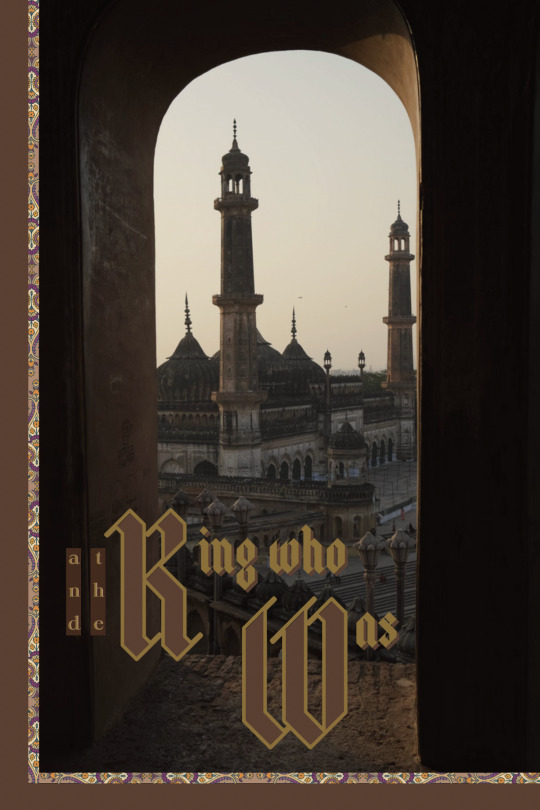

“Tar-Elendil, the fourth king, was succeeded by his son Tar-Meneldur, though his daughter Silmariën was the elder." - J.R.R. Tolkien, The Return of the King, footnote to "Appendix A: Annals of the Kings and Rulers" "Meneldur was the son of Tar-Elendil, the fourth King of Númenor. He was the King's third child, for he had two sisters, named Silmariën and Isilmë. The elder of these was wedded to Elatan of Andúnië and their son was Valandil, Lord of Andúnië, from whom came long after the lines of the Kings of Gondor and Arnor in Middle-earth. Meneldur was a man of gentle mood, without pride, whose exercise was rather in thought than in deeds of the body. . .All that he could gather of the lore of the Eldar and Edain concerning Eä and the deeps that lay about the Kingdom of Arda he studied, and his chief delight was in the watching of the stars." - J.R.R. Tolkien, Unfinished Tales, "Aldarion and Erendis: The Mariner's Wife"
[ID: an edit composed of four posters in muted shades of brown, red, and greenish hues. Each poster is framed on two sides by two brown stripes, the thinner of which is patterned--together they create a frame around all four images.
1: Anugraha Natarajan, a tamil indian model with brown skin and dark hair. She is draped in a dark veil embroidered in gold and wears a jeweled headpiece. Her gaze is on the viewer though her head is turned slightly to the side. Green and brown text reads "silmariën," "princess," and "maiden garlanded with shining light" / 2: Several richly decorated arches in a classical indian style, held up by dark columns between which other arches can be seen. Text reads "the could've-been queen" / 3: A classical indian palace seen through a window, the towers vivid against the sky. Text reads "and the king who was" / 4: Anthony O. Gomes, an indian model with brown skin, dark hair, and a beard. He is seated on the ground, wearing a black shirt resembling a starry sky, white silk trousers, and silver jewelry. He looks earnest and serious and lifts a handful of pearls. Text in the same arrangement as Image 1, though on the opposite sides, reads "meneldur," "polymath," and "servant of the heavens" //End ID]
#silmariën#tar-meneldur#the silmarillion#unfinished tales#the mariner's wife#tolkienedit#tolkiensource#sourcetolkien#silmedit#oneringnet#mepoc#fantasyedit#númenor#edits with the wild hunt#brought to you by me#posters#described
48 notes
·
View notes
Text
Get to know Sri
Stage Name: Sri
Birth Name: Srihari Venkat
Nationality: Australian
Ethnicity: Indian
Position: Rapper, Dancer, Producer
Birthday: July 9 1988
Zodiac Sign: Cancer
Height: 170 cm (5'7")
Blood type: O+
MBTI: INTP
Representative animal: 🐱(I don't really remember if it is used to represent Lee Know as well, so feel free to correct me if I'm wrong)
Unit: DanceRacha, 3Racha(Don't really think it'd be 3 anymore tho-)
Facts about Sri
He was born in Brisbane, Australia
Has a younger sister who's 5 years younger than him
Came to Korea to train when he was 18
He had very little training in dance (the training being the dance classes he had joined when he was 7/8 years old for a few months) before he was recruited
Although He had been learning Carnatic music ever since he was 3, he stopped learning at the age of 14 (so about 11 years of experience)
He auditioned to be an idol out of spite for his dad
He had been doing his bachelor's degree and masters in architecture while being an idol as he 'wanted to have a back-up plan just in case'
He has a mole on his right cheekbone
He was a trainee for about 2 years
Nicknames given by STAY: Chan's wife, Nicknames given by the members: Eomma, Venki
He treats English as his first language. He can speak Japanese fluently, Tamil (his mother tongue), and Hindi to a decent extent. He can also speak French and Mandarin but no one really knows that he can speak those two languages
He can draw and paint quite well when given a reference but he says he lacks the creative skills to just visualise something and draw it
As per the members, he has quite a laid-back personality and is a comfort figure to all of them. They also say that he's quite good at giving advice even if he hadn't been in the situation himself
As per Chan, Sri struggles to express his emotions as he fears that he'd be burdening others by telling them about his struggles. And even if Sri does express his emotions, he struggles to frame and tell others about how exactly he feels about something
He has double-jointed thumbs and elbows
He has a driver's license and enjoys going on long drives with his members
When he isn't driving, you can always spot him wearing his headphones and gazing out the window
His favourite season is Spring and he loves rainy and stormy weather
He actually is a vegetarian and does not eat any type of meat
He is extremely introverted when it comes to social interactions with people he doesn't know quite well but is also one of the most upbeat when around the members, kinda like another member Han
He has very strong opinions and will not hesitate to express them. This trait of his has gotten him into quite a few scandals
His favourite colour is purple
He doesn't really have a favourite food, he will enjoy anything that is mentioned to be spicy but he actively avoids most fruit, his least favourite being strawberries and any kind of melon except watermelon
He prefers producing songs rather than songwriting
He has a pet dog named Cosmo back in Australia and also owns two cats in Korea, named Blossom and Buttercup, Blossom is a ginger cat and Buttercup is a black cat
As per the members and STAY, Sri is a caring person, prepared for almost any situation that comes his way. He seems to always put the members before his own needs. In the first one Kid's Room, he said that if given a choice to protect either himself or his loved ones, he'd always pick to protect his loved ones as he'd rather not live than imagine living a life without his loved ones
He is the typical 'mom friend', always having something or the other in his bag for any situation, earning his nickname 'Eomma'. You're hungry? Sri has a snack bar in his backpack. You got hurt? He's got a first-aid kit somewhere in his bag, You need anything ranging from a charger to a makeup product? Sri's always got something in his bag
He loves dad jokes and puns
He lives true to his MBTI, trying to see logic even when it isn't required.
He shares his dorm with Chan and I.N
He is SKZ's handyman being able to fix most things that the others break. That being said, he is the one who ends up breaking most things due to his clumsy ass
He tends to seem quite calm under pressure although he most probably is panicking internally
He is a major perfectionist and will redo his autograph multiple times during fan meetings and signings, just so that it's 'perfect'
Although Sri would much rather cook and bake alone as doing it alone gets him in his 'zone', he enjoys baking and cooking with Felix and Minho as well
He often tricks the other members into eating vegetarian food and then just lets them guess the 'meat' that was in the dish when in reality it's either cauliflower or some form of soy. He does this just to prove a point to them as most of them have this general notion that vegetarian food is bland
He often goes to the gym alongside Chan and Changbin
He usually helps Chan with leading the members on days when Chan is too exhausted to do it himself
He is friends with Hongjoong, San, and Mingi from ATEEZ
He is often seen hanging out with Yeji and Ryujin from ITZY
10 notes
·
View notes
Note
NIKKI!!
Fierce little Crow Indian girl. Accomplished thief. Sassy and clever. The personality of a dozen firecrackers tied into a burlap bag - and sometimes with lit fuses when she's mad. Overactive Sibling-Parent gene. In desperate, desperate need of love. Way too used to taking care of herself.
A squeak from the window behind them as it slides up the frame and then Nikki’s voice calls out, “They’re not wolves! They kill wolves! And traffickers! And gangbangers! And they rescue kids like me!” The kid has startled back about a yard at this new sound. He says, “Who’s that.” Riser rubs his forehead wearily as Max sniggers, and turns and hollers at the house, "Pocahontas close that window!" He turns back to the kid and says resignedly, "M' daughter." The kid says blankly, “Your daughter’s name is Pocahontas?” “My real name is Sitting Bull!” Nikki calls out merrily. "And Geronimo, when you're being a bloodthirsty little turd," Riser adds, unable to resist.
Despite being a mere ten/eleven years old, Nikki is determined to carry on the mantle of the Family Business. One of her most prized possessions is a pair of brass knuckles gifted to her by her Uncle Max. Her other most prized possession is the leather biker jacket with the white Star blazoned across her back, that marks her as a Way.
.
10 notes
·
View notes
Text
"Hawthorne and His Mosses" by Herman Melville
A papered chamber in a fine old farm-house--a mile from any other dwelling, and dipped to the eaves in foliage--surrounded by mountains, old woods, and Indian ponds,--this, surely is the place to write of Hawthorne. Some charm is in this northern air, for love and duty seem both impelling to the task. A man of a deep and noble nature has seized me in this seclusion. His wild, witch voice rings through me; or, in softer cadences, I seem to hear it in the songs of the hill-side birds, that sing in the larch trees at my window.
Would that all excellent books were foundlings, without father or mother, that so it might be, we could glorify them, without including their ostensible authors. Nor would any true man take exception to this;--least of all, he who writes,--"When the Artist rises high enough to achieve the Beautiful, the symbol by which he makes it perceptible to mortal senses becomes of little value in his eyes, while his spirit possesses itself in the enjoyment of the reality."
But more than this, I know not what would be the right name to put on the title-page of an excellent book, but this I feel, that the names of all fine authors are fictitious ones, far more than that of Junius,--simply standing, as they do, for the mystical, ever-eluding Spirit of all Beauty, which ubiquitously possesses men of genius. Purely imaginative as this fancy may appear, it nevertheless seems to receive some warranty from the fact, that on a personal interview no great author has ever come up to the idea of his reader. But that dust of which our bodies are composed, how can it fitly express the nobler intelligences among us? With reverence be it spoken, that not even in the case of one deemed more than man, not even in our Saviour, did his visible frame betoken anything of the augustness of the nature within. Else, how could those Jewish eyewitnesses fail to see heaven in his glance.
It is curious, how a man may travel along a country road, and yet miss the grandest, or sweetest of prospects, by reason of an intervening hedge, so like all other hedges, as in no way to hint of the wide landscape beyond. So has it been with me concerning the enchanting landscape in the soul of this Hawthorne, this most excellent Man of Mosses. His "Old Manse" has been written now four years, but I never read it till a day or two since. I had seen it in the book-stores--heard of it often--even had it recommended to me by a tasteful friend, as a rare, quiet book, perhaps too deserving of popularity to be popular. But there are so many books called "excellent," and so much unpopular merit, that amid the thick stir of other things, the hint of my tasteful friend was disregarded; and for four years the Mosses on the Old Manse never refreshed me with their perennial green. It may be, however, that all this while, the book, like wine, was only improving in flavor and body. At any rate, it so chanced that this long procrastination eventuated in a happy result. At breakfast the other day, a mountain girl, a cousin of mine, who for the last two weeks has every morning helped me to strawberries and raspberries,--which like the roses and pearls in the fairy-tale, seemed to fall into the saucer from those strawberry-beds her cheeks,--this delightful crature, this charming Cherry says to me--"I see you spend your mornings in the hay-mow; and yesterday I found there 'Dwight's Travels in New England'. Now I have something far better than that,--something more congenial to our summer on these hills. Take these raspberries, and then I will give you some moss."--"Moss!" said I--"Yes, and you must take it to the barn with you, and good-bye to 'Dwight.'"
With that she left me, and soon returned with a volume, verdantly bound, and garnished with a curious frontispiece in green,--nothing less, than a fragment of real moss cunningly pressed to a fly-leaf.--"Why this," said I, spilling my raspberries, "this is the 'Mosses from an Old Manse'." "Yes," said cousin Cherry, "yes, it is that flowery Hawthorne."--"Hawthorne and Mosses," said I, "no more: it is morning: it is July in the country: and I am off for the barn."
Stretched on that new mown clover, the hill-side breeze blowing over me through the wide barn door, and soothed by the hum of the bees in the meadows around, how magically stole over me this Mossy Man! And how amply, how bountifully, did he redeem that delicious promise to his guests in the Old Manse, of whom it is written--"Others could give them pleasure, or amusement, or instruction--these could be picked up anywhere--but it was for me to give them rest. Rest, in a life of trouble! What better could be done for weary and world-worn spirits? what better could be done for anybody, who came within our magic circle, than to throw the spell of a magic spirit over them?"--So all that day, half-buried in the new clover, I watched this Hawthorne's "Assyrian dawn, and Paphian sunset and moonrise, from the summit of our Eastern Hill."
The soft ravishments of the man spun me round in a web of dreams, and when the book was closed, when the spell was over, this wizard "dismissed me with but misty reminiscences, as if I had been dreaming of him."
What a mild moonlight of contemplative humor bathes that Old Manse!--the rich and rare distilment of a spicy and slowly-oozing heart. No rollicking rudeness, no gross fun fed on fat dinners, and bred in the lees of wine,--but a humor so spiritually gentle, so high, so deep, and yet so richly relishable, that it were hardly inappropriate in an angel. It is the very religion of mirth; for nothing so human but it may be advanced to that. The orchard of the Old Manse seems the visible type of the fine mind that has described it. Those twisted, and contorted old trees, "that stretch out their crooked branches, and take such hold of the imagination, that we remember them as humorists and odd-fellows." And then, as surrounded by these grotesque forms, and hushed in the noon-day repose of this Hawthorne's spell, how aptly might the still fall of his ruddy thoughts into your soul be symbolized by "the thump of a great apple, in the stillest afternoon, falling without a breath of wind, from the mere necessity of perfect ripeness"! For no less ripe than ruddy are the apples of the thoughts and fancies in this sweet Man of Mosses.
"Buds and Bird-Voices"--What a delicious thing is that!--"Will the world ever be so decayed, that Spring may not renew its greeness?"--And the "Fire-Worship." Was ever the hearth so glorified into an altar before? The mere title of that piece is better than any common work in fifty folio volumes. How exquisite is this:--"Nor did it lessen the charm of his soft, familiar courtesy and helpfulness, that the mighty spirit, were opportunity offered him, would run riot through the peaceful house, wrap its inmates in his terrible embrace, and leave nothing of them save their whitened bones. This possibility of mad destruction only made his domestic kindness the more beautiful and touching. It was so sweet of him, being endowed with such power, to dwell, day after day, and one long, lonesome night after another, on the dusky hearth, only now and then betraying his wild nature, by thrusting his red tongue out of the chimney-top! True, he had done much mischief in the world, and was pretty certain to do more, but his warm heart atoned for all. He was kindly to the race of man."
But he has still other apples, not quite so ruddy, though full as ripe:--apples, that have been left to wither on the tree, after the pleasant autumn gathering is past. The sketch of "The Old Apple Dealer" is conceived in the subtlest spirit of sadness; he whose "subdued and nerveless boyhood prefigured his abortive prime, which, likewise, contained within itself the prophecy and image of his lean and torpid age." Such touches as are in this piece can not proceed from any common heart. They argue such a depth of tenderness, such a boundless sympathy with all forms of being, such an omnipresent love, that we must needs say, that this Hawthorne is here almost alone in his generation,--at least, in the artistic manisfestation of these things. Still more. Such touches as these,--and many, very many similar ones, all through his chapters--furnish clews, whereby we enter a little way into the intricate, profound heart where they originated. And we see, that suffering, some time or other and in some shape or other,--this only can enable any man to depict it in others. All over him, Hawthorne's melancholy rests like an Indian summer, which, though bathing a whole country in one softness, still reveals the distinctive hue of every towering hill, and each far-winding vale.
But it is the least part of genius that attracts admiration. Where Hawthorne is known, he seems to be deemed a pleasant writer, with a pleasant style,--a sequestered, harmless man, from whom any deep and weighty thing would hardly be anticipated:--a man who means no meanings. But there is no man, in whom humor and love, like mountain peaks, soar to such a rapt height, as to receive the irradiations of the upper skies;--there is no man in whom humor and love are developed in that high form called genius; no such man can exist without also possessing, as the indispensable complement of these, a great, deep intellect, which drops down into the universe like a plummet. Or, love and humor are only the eyes, through which such an intellect views this world. The great beauty in such a mind is but the product of its strength. What, to all readers, can be more charming than the piece entitled "Monsieur du Miroir"; and to a reader at all capable of fully fathoming it, what at the same time, can possess more mystical depth of meaning?--Yes, there he sits, and looks at me,--this "shape of mystery," this "identical Monsieur du Miroir."--"Methinks I should tremble now, were his wizard power of gliding through all impediments in search of me, to place him suddenly before my eyes."
How profound, nay appalling, is the moral evolved by the "Earth's Holocaust"; where--beginning with the hollow follies and affectations of the world,--all vanities and empty theories and forms, are, one after another, and by an admirably graduated, growing comprehensiveness, thrown into the allegorical fire, till, at length, nothing is left but the all-engendering heart of man; which remaining still unconsumed, the great conflagration is naught.
Of a piece with this, is the "Intelligence Office," a wondrous symbolizing of the secret workings in men's souls. There are other sketches, still more charged with ponderous import.
"The Christmas Banquet," and "The Bosom Serpent" would be fine subjects for a curious and elaborate analysis, touching the conjectural parts of the mind that produced them. For spite of all the Indian-summer sunlight on the hither side of Hawthorne's soul, the other side--like the dark half of the physical sphere--is shrouded in a blackness, ten times black. But this darkness but gives more effect to the evermoving dawn, that forever advances through it, and cirumnavigates his world. Whether Hawthorne has simply availed himself of this mystical blackness as a means to the wondrous effects he makes it to produce in his lights and shades; or whether there really lurks in him, perhaps unknown to himself, a touch of Puritanic gloom,--this, I cannot altogether tell. Certain it is, however, that this grat power of blackness in him derives its force from its appeals to that Calvinistic sense of Innate Depravity and Original Sin, from whose visitations, in some shape or other, no deeply thinking mind is always and wholly free. For, in certain moods, no man can weigh this world, without throwing in something, somehow like Original Sin, to strike the uneven balance. At all events, perhaps no writer has ever wielded this terrific thought with greater terror than this same harmless Hawthorne. Still more: this black conceit pervades him, through and through. You may be witched by his sunlight,--transported by the bright gildings in the skies he builds over you;--but there is the blackness of darkness beyond; and even his bright gildings but fringe, and play upon the edges of thunder-clouds.--In one word, the world is mistaken in this Nathaniel Hawthorne. He himself must often have smiled at its absurd misconceptions of him. He is immeasurably deeper than the plummet of the mere critic. For it is not the brain that can test such a man; it is only the heart. You cannot come to know greatness by inspecting it; there is no glimpse to be caught of it, except by intuition; you need not ring it, you but touch it, and you find it is gold.
Now it is that blackness in Hawthorne, of which I have spoken, that so fixes and fascinates me. It may be, nevertheless, that it is too largely developed in him. Perhaps he does not give us a ray of his light for every shade of his dark. But however this may be, this blackness it is that furnishes the infinite obscure of his background,--that background, against which Shakespeare plays his grandest conceits, the things that have made for Shakespeare his loftiest, but most circumscribed renown, as the profoundest of thinkers. For by philosophers Shakespeare is not adored as the great man of tragedy and comedy.--"Off with his head! so much for Buckingham!" this sort of rant, interlined by another hand, brings down the house,--those mistaken souls, who dream of Shakespeare as a mere man of Richard-the-Third humps, and Macbeth daggers. But it is those deep far-away things in him; those occasional flashings-forth of the intuitive Truth in him; those short, quick probings at the very axis of reality:--these are the things that make Shakespeare, Shakespeare. Through the mouths of the dark characters of Hamlet, Timon, Lear, and Iago, he craftily says, or sometimes insinuates the things, which we feel to be so terrifically true, that it were all but madness for any good man, in his own proper character, to utter, or even hint of them. Tormented into desperation, Lear the frantic King tears off the mask, and speaks the sane madness of vital truth. But, as I before said, it is the least part of genius that attracts admiration. And so, much of the blind, unbridled admiration that has been heaped upon Shakespeare, has been lavished upon the least part of him. And few of his endless commentators and critics seem to have remembered, or even perceived, that the immediate products of a great mind are not so great, as that undeveloped, (and sometimes undevelopable) yet dimly-discernible greatness, to which these immediate products are but the infallible indices. In Shakespeare's tomb lies infinitely more than Shakespeare ever wrote. And if I magnify Shakespeare, it is not so much for what he did do, as for what he did not do, or refrained from doing. For in this world of lies, Truth is forced to fly like a scared white doe in the woodlands; and only by cunning glimpses will she reveal herself, as in Shakespeare and other masters of the great Art of Telling the Truth,--even though it be covertly, and by snatches.
But if this view of the all-popular Shakespeare be seldom taken by his readers, and if very few who extol him, have ever read him deeply, or, perhaps, only have seen him on the tricky stage, (which alone made, and is still making him his mere mob renown)--if few men have time, or patience, or palate, for the spiritual truth as it is in that great genius;--it is, then, no matter of surprise that in a contemporaneous age, Nathaniel Hawthorne is a man, as yet, almost utterly mistaken among men. Here and there, in some quiet arm-chair in the noisy town, or some deep nook among the noiseless mountains, he may be appreciated for something of what he is. But unlike Shakespeare, who was forced to the contrary course by circumstances, Hawthorne (either from simple disinclination, or else from inaptitude) refrains from all the popularizing noise and show of broad farce, and blood-besmeared tragedy; content with the still, rich utterances of a great intellect in repose, and which sends few thoughts into circulation, except they be arterialized at his large warm lungs, and expanded in his honest heart.
Nor need you fix upon that blackness in him, if it suit you not. Nor, indeed, will all readers discern it, for it is, mostly, insinuated to those who may best undersand it, and account for it; it is not obtruded upon every one alike.
Some may start to read of Shakespeare and Hawthorne on the same page. They may say, that if an illustration were needed, a lesser light might have sufficed to elucidate this Hawthorne, this small man of yesterday. But I am not, willingly, one of those, who as touching Shakespeare at least, exemplify the maxim of Rochefoucauld, that "we exalt the reputation of some, in order to depress that of others";--who, to teach all noble-souled aspirants that there is no hope for them, pronounce Shakespeare absolutely unapproachable. But Shakespeare has been approached. There are minds that have gone as far as Shakespeare into the universe. And hardly a mortal man, who, at some time or other, has not felt as great thoughts in him as any you will find in Hamlet. We must not inferentially malign mankind for the sake of any one man, whoever he may be. This is too cheap a purchase of contentment for consious mediocrity to make. Besides, this absolute and unconditional adoration of Shakespeare has grown to be a part of our Anglo Saxon superstitions. The Thirty-Nine Articles are now Forty. Intolerance has come to exist in this matter. You must believe in Shakespeare's unapproachability, or quit the country. But what sort of belief is this for an American, an man who is bound to carry republican progressiveness into Literature, as well as into Life? Believe me, my friends, that men not very much inferior to Shakespeare, are this day being born on the banks of the Ohio. And the day will come, when you shall say who reads a book by an Englishman that is a modern? The great mistake seems to be, that even with those Americans who look forward to the coming of a great literary genius among us, they somehow fancy he will come in the costume of Queen Elizabeth's day,--be a writer of dramas founded upon old English history, or the tales of Boccaccio. Whereas, great geniuses are parts of the times; they themselves are the time; and possess an correspondent coloring. It is of a piece with the Jews, who while their Shiloh was meekly walking in their streets, were still praying for his magnificent coming; looking for him in a chariot, who was already among them on an ass. Nor must we forget, that, in his own life-time, Shakespeare was not Shakespeare, but only Master William Shakespeare of the shrewd, thriving business firm of Condell, Shakespeare & Co., proprietors of the Globe Theater in London; and by a courtly author, of the name of Chettle, was hooted at, as an "upstart crow" beautfied "with other birds' feathers." For, mark it well, imitation is often the first charge brought against real originality. Why this is so, there is not space to set forth here. You must have plenty of sea-room to tell the Truth in; especially, when it seems to have an aspect of newness, as American did in 1492, though it was then just as old, and perhaps older than Asia, only those sagacious philosophers, the common sailors, had never seen it before; swearing it was all water and moonshine there.
Now, I do not say that Nathaniel of Salem is a greater than William of Avon, or as great. But the difference between the two men is by no means immeasurable. Not a very great deal more, and Nathaniel were verily William.
This too, I mean, that if Shakespeare has not been equalled, give the world time, and he is sure to be surpassed, in one hemisphere or the other. Nor will it at all do to say, that the world is getting grey and grizzled now, and has lost that fresh charm which she wore of old, and by virtue of which the great poets of past times made themselves what we esteem them to be. Not so. the world is as young today, as when it was created, and this Vermont morning dew is as wet to my feet, as Eden's dew to Adam's. Nor has Nature been all over ransacked by our progenitors, so that no new charms and mysteries remain for this latter generation to find. Far from it. The trillionth part has not yet been said, and all that has been said, but multiplies the avenues to what remains to be said. It is not so much paucity, as superabundance of material that seems to incapacitate modern authors.
Let American then prize and cherish her writers, yea, let her glorify them. They are not so many in number, as to exhaust her good-will. And while she has good kith and kin of her own, to take to her bosom, let her not lavish her embraces upon the household of an alien. For believe it or not England, after all, is, in many things, an alien to us. China has more bowels of real love for us than she. But even were there no strong literary individualities among us, as there are some dozen at least, nevertheless, let America first praise mediocrity even, in her own children, before she praises (for everywhere, merit demands acknowledgment from every one) the best excellence in the children of any other land. Let her own authors, I say, have the priority of appreciation. I was very much pleased with a hot-headed Carolina cousin of mine, who once said,--"If there were no other American to stand by, in Literature,--why, then, I would stand by Pop Emmons and his 'Fredoniad,' and till a better epic came along, swear it was not very far behind the 'Iliad'." Take away the words, and in spirit he was sound.
Not that American genius needs patronage in order to expand. For that explosive sort of stuff will expand though screwed up in a vice, and burst it, though it were triple steel. It is for the nation's sake, and not for her authors' sake, that I would have America be heedful of the increasing greatness among her writers. For how great the shame, if other nations should be before her, in crowning her heroes of the pen. But this is almost the case now. American authors have received more just and discriminating praise (however loftily and ridiculously given, in certain cases) even from some Englishmen, than from their own countrymen. There are hardly five critics in America, and several of them are asleep. As for patronage, it is the American author who now patronizes the country, and not his country him. And if at times some among them appeal to the people for more recognition, it is not always with selfish motives, but patriotic ones.
It is true, that but few of them as yet have evinced that decided originality which merits great praise. But that graceful writer, who perhaps of all Americans has received the most plaudits from his own country for his productions,--that very popular and amiable writer, however good, and self-reliant in many things, perhaps owes his chief reputation to the self-acknowledged imitation of a foreign model, and to the studied avoidance of all topics but smooth ones. But it is better to fail in originality, than to succeed in imitation. He who has never failed somewhere, that man can not be great. Failure is the true test of greatness. And if it be said, that continual success is a proof that a man wisely knows his powers,--it is only to be added, that, in that case, he knows them to be small. Let us believe it, then, once for all, that there is no hope for us in these smooth pleasing writers that know their powers. Without malice, but to speak the plain fact, they but furnish an appendix to Goldsmith, and other English authors. And we want no American Goldsmiths, nay, we want no American Miltons. It were the vilest thing you could say of a true American author, that he were an American Tompkins. Call him an American, and have done, for you can not say a nobler thing of him.--But it is not meant that all American writers should studiously cleave to nationality in their writings; only this, no American writer should write like an Englishman, or a Frenchman; let him write like a man, for then he will be sure to write like an American. Let us away with this leaven of literary flunkyism towards England. If either we must play the flunky in this thing, let England do it, not us. While we are rapidly preparing for that political supremacy among the nations, which prophetically awaits us at the close of the present century; in a literary point of view, we are deplorably unprepared for it; and we seem studious to remain so. Hitherto, reasons might have existed why this should be; but no good reason exists now. And all that is requisite to amendment in this matter, is simply this: that, while freely acknowledging all excellence, everywhere, we should refrain from unduly lauding foreign writers, and, at the same time, duly recognize the meritorious writers that are our own,--those writers, who breathe that unshackled, democratic spirit of Christianity in all things, which now takes the practical lead in the world, though at the same time led by ourselves--us Americans. Let us boldly contemn all imitation, though it comes to us graceful and fragrant as the morning; and foster all originality, though, at first, it be crabbed and ugly as our own pine knots. And if any of our authors fail, or seem to fail, then, in the words of my enthusiastic Carolina cousin, let us clap him on the shoulder, and back him against all Europe for his second round. The truth is, that in our point of view, this matter of a national literature has come to such a pass with us, that in some sense we must turn bullies, else the day is lost, or superiority so far beyond us, that we can hardly say it will ever be ours.
And now, my countrymen, as an excellent author, of your own flesh and blood,--an unimitating, and perhaps, in his way, an inimitable man--whom better can I commend to you, in the first place, than Nathaniel Hawthorne. He is one of the new, and far better generation of your writer. The smell of your beeches and hemlocks is upon him; your own broad prairies are in his soul; and if you travel away inland into his deep and noble nature, you will hear the far roar of his Niagara. Give not over to future generations the glad duty of acknowledging him for what he is. Take that joy to yourself, in your own generation; and so shall he feel those grateful impulses in him, that may possibly prompt him to the full flower of some still greater achievement in your eyes. And by confessing him, you thereby confess others, you brace the whole brotherhood. For genius, all over the world, stands hand in hand, and one shock of recognition runs the whole circle round.
In treating of Hawthorne, or rather of Hawthorne in his writings (for I never saw the man; and in the chances of a quiet plantation life, remote from his haunts, perhaps never shall) in treating of his works, I say, I have thus far omitted all mention of his "Twice Told Tales," and "Scarlet Letter." Both are excellent, but full of such manifold, strange and diffusive beauties, that time would all but fail me, to point the half of them out. But there are things in those two books, which, had they been written in England a century ago, Nathaniel Hawthorne had utterly displaced many of the bright names we now revere on authority. But I content to leave Hawthorne to himself, and to the infallible finding of posterity; and however great may be the praise I have bestowed upon him, I feel, that in so doing, I have more served and honored myself, than him. For at bottom, great excellence is praise enough to itself; but the feeling of a sincere and appreciative love and admiration towards it, this is relieved by utterance; and warm, honest praise ever leaves a pleasant flavor in the mouth; and it is an honorable thing to confess to what is honorable in others.
But I cannot leave my subject yet. No man can read a fine author, and relish him to his very bones, while he reads, without subsequently fancying to himself some ideal image of the man and his mind. And if you rightly look for it, you will almost always find that the author himself has somewhere furnished you with his own picture. For poets (whether in prose or verse), being painters of Nature, are like their brethren of the pencil, the true portrait-painters, who, in the multitude of likenesses to be sketched, do not invariably omit their own; and in all high instances, they paint them without any vanity, though, at times, with a lurking something, that would take several pages to properly define.
I submit it, then, to those best acquainted with the man personally, whether the following is not Nathaniel Hawthorne,--to to himself, whether something involved in it does not express the temper of this mind,--that lasting temper of all true, candid men--a seeker, not a finder yet:--
A man now entered, in neglected attire, with the aspect of a thinker, but somewhat too rough-hewn and brawny for a scholar. His face was full of sturdy vigor, with some finer and keener attribute beneath; though harsh at first, it was tempered with the glow of a large, warm heart, which had force enough to heat his powerful intellect through and through. He advanced to the Intelligencer, and looked at him with a glance of such stern sincerity, that perhaps few secrets were beyond its scope.
"'I seek for Truth,' said he."
Twenty-four hours have elapsed since writing the foregoing. I have just returned from the hay mow, charged more and more with love and admiration of Hawthorne. For I have just been gleaning through the "Mosses," picking up many things here and there that had previously escaped me. And I found that but to glean after this man, is better than to be in at the harvest of others. To be frank (though, perhaps, rather foolish), notwithstanding what I wrote yesterday of these Mosses, I had not then culled them all; but had, nevertheless, been sufficiently sensible of the subtle essence, in them, as to write as I did. to what infinite height of loving wonder and admiration I may yet be borne, when by repeatedly banquetting on these Mosses, I shall have thoroughly incorporated their whole stuff into my being,--that, I can not tell. But already I feel that this Hawthorne has dropped germinous seeds into my soul. He expands and deepens down, the more I contemplate him; and further, and further, shoots his strong New-England roots into the hot soil of my Southern soul.
By careful reference to the "Table of Contents," I now find, that I have gone through all the sketches; but that when I yeterday wrote, I had not at all read two particular pieces, to which I now desire to call special attention,--"A Select Party," and "Young Goodman Brown." Here, be it said to all those whom this poor fugitive scrawl of mine may tempt to the purusal of the "Mosses," that they must on no account suffer themselves to be trifled with, disappointed, or deceived by the triviality of many of the titles to these Sketches. For in more than one instance, the title utterly belies the piece. It is as if rustic demjohns containing the very best and costliest of Falernian and Tokay, were labeled "Cider," "Perry," and "Elder-berry Wine." The truth seems to be, that like many other geniuses, this Man of Mosses takes great delight in hoodwinking the world,--at least, with respect to himself. Personally, I doubt not, that he rather prefers to be generally esteemed but a so-so sort of author; being willing to reserve the thorough and acute appreciation of what he is, to that party most qualified to judge--that is, to himself. Besides, at the bottom of their natures, men like Hawthorne, in many things, deem the plaudits of the public such strong presumptive evidence of mediocrity in the object of them, that it would in some degree render them doubtful of their own powers, did they hear much and vociferous braying concerning them in the public pastures. True, I have been braying myself (if you please to be witty enough, to have it so) but then I claim to be the first that has so brayed in this particular matter; and therefore, while pleading guilty to the charge, still claim all the merit due to originality.
But with whatever motive, playful or profound, Nathaniel Hawthorne has chosen to entitle his pieces in the manner he has, it is certain, that some of them are directly calculated to deceive--egregiously deceive--the superficial skimmer of pages. To be downright and candid once more, let me cheerfully say, that two of these titles did dolefully dupe no less an eagle-eyed reader than myself, and that, too, after I had been impressed with a sense of the great depth and breadth of this American man. "Who in the name of thunder," (as the country-people say in this neighborhood), "who in the name of thunder, would anticipate any marvel in a piece entitled "Young Goodman Brown"? You would of course suppose that it was a simple little tale, intended as a supplement to "Goody Two Shoes." Whereas, it is deep as Dante; nor can you finish it, without addressing the author in his own words--"It is yours to penetrate, in every bosom, the deep mystery of sin." And with Young Goodman, too, in allegorical pursuit of his Puritan wife, you cry out in your anguish,--
"Faith!" shouted Goodman Brown, in a voice of agony and desperation; and the echoes of the forest mocked him, crying--"Faith! Faith!" as if bewildered wretches were seeking her all through the wilderness.
Now this same piece, entitled "Young Goodman Brown," is one of the two that I had not all read yesterday; and I allude to it now, because it is, in itself, such a strong positive illustration of that blackness in Hawthorne, which I had assumed from the mere occasional shadows of it, as revealed in several of the other sketches. But had I previously perused "Young Goodman Brown," I should have been at no pains to draw the conclusion, which I came to, at a time, when I was ignorant that the book contained one such direct and unqualified manifestation of it.
The other piece of the two referred to, is entitled "A Select Party," which in my first simplicity upon originally taking hold of the book, I fancied must treat of some pumpkin-pie party in Old Salem, or some Chowder Party on Cape Cod. Whereas, by all the gods of Peedee! it is the sweetest and sublimest thing that has been written since Spenser wrote. Nay, there is nothing in Spenser that surpasses it, perhaps, nothing that equals it. And the test is this: read any canto in "The Faery Queen," and then read "A Select Party," and decide which pleases you the most,--that is, if you are qualified to judge. Do not be frightened at this; for when Spenser was alive, he was thought of very much as Hawthorne is now--was generally accounted just such a "gentle" harmless man. It may be, that to common eyes, the sublimity of Hawthorne seems lost in his sweetness,--as perhaps in this same "Select Party" his; for whom, he has builded so august a dome of sunset clouds, and served them on richer plate, than Belshazzar's when he banquetted his lords in Babylon.
But my chief business now, is to point out a particular page in this piece, having reference to an honored guest, who under the name of "The Master Genius" but in the guise "of a young man of poor attire, with no insignia of rank or acknowledged eminence," is introduced to the Man of Fancy, who is the giver of the feast. Now the page having reference to this "Master Genius", so happily expresses much of what I yesterday wrote, touching the coming of the literary Shiloh of America, that I cannot but be charmed by the coincidence; especially, when it shows such a parity of ideas, at least, in this one point, between a man like Hawthorne and a man like me.
And here, let me throw out another conceit of mine touching this American Shiloh, or "Master Genius," as Hawthorne calls him. May it not be, that this commanding mind has not been, is not, and never will be, individually developed in any one man? And would it, indeed, appear so unreasonable to suppose, that this great fullness and overlowing may be, or may be destined to be, shared by a plurality of men of genius? Surely, to take the very greatest example on record, Shakespeare cannot be regarded as in himself the concretion of all the genius of his time; nor as so immeasurably beyond Marlowe, Webster, Ford, Beaumont, Johnson, that those great men can be said to share none of his power? For one, I conceive that there were dramatists in Elizabeth's day, between whom and Shakespeare the distance was by no means great. Let anyone, hitherto little acquainted with those neglected old authors, for the first time read them thoroughly, or even read Charles Lamb's Specimens of them, and he will be amazed at the wondrous ability of those Anaks of men, and shocked at this renewed example of the fact, that Fortune has more to do with fame than merit,--though, without merit, lasting fame there can be none.
Nevertheless, it would argue too illy of my country were this maxim to hold good concerning Nathaniel Hawthorne, a man, who already, in some minds, has shed "such a light, as never illuminates the earth, save when a great heart burns as the household fire of a grand intellect."
The words are his,--in the "Select Party"; and they are a magnificent setting to a coincident sentiment of my own, but ramblingly expressed yesterday, in reference ot himself. Gainsay it who will, as I now write, I am Posterity speaking by proxy--and after times will make it more than good, when I declare--that the American, who up to the present day, has evinced, in Literature, the largest brain with the largest heart, that man is Nathaniel Hawthorne. Moreover, that whatever Nathaniel Hawthorne may hereafter write, "The Mosses from an Old Manse" will be ultimately accounted his masterpiece. For there is a sure, though a secret sign in some works which proves the culmination of the power (only the developable ones, however) that produced them. But I am by no means desirous of the glory of a prophet. I pray Heaven that Hawthorne may yet prove me an impostor in this prediciton. Especially, as I somehow cling to the strange fancy, that, in all men, hiddenly reside certain wondrous, occult properties--as in some plants and minerals--which by some happy but very rare accident (as bronze was discovered by the melting of the iron and brass in the burning of Corinth) may chance to be called forth here on earth, not entirely waiting for their better discovery in the more congenial, blessed atmosphere of heaven.
Once more--for it is hard to be finite upon an infinite subject, and all subjects are infinite. By some people, this entire scrawl of mine may be esteemed altogether unnecessary, inasmuch, "as years ago" (they may say) "we found out the rich and rare stuff in this Hawthorne, whom you now parade forth, as if only yourself were the discoverer of this Portuguese diamond in our Literature."--But even granting all this; and adding to it, the assumption that the books of Hawthorne have sold by the five-thousand,--what does that signify?--They should be sold by the hundred-thousand, and read by the million; and admired by every one who is capable of Admiration.
3 notes
·
View notes
Photo
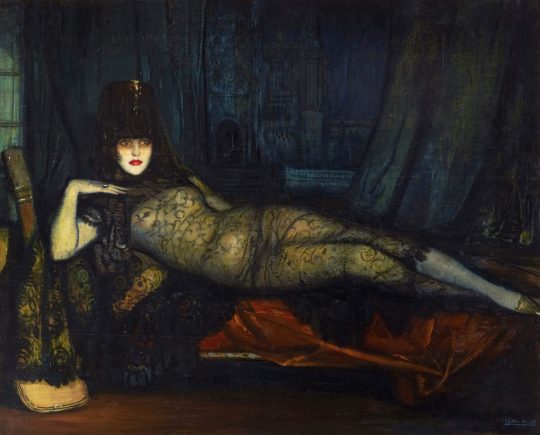
Maja Maldita by Federico Beltrán Masses, 1918, oil on canvas, 161.5 x 202 cm.
For contemporary critics and collectors, La Maja Maldita was perhaps the most famous of Beltran Masses' œuvre. The fact that it is also a portrait of an extraordinary figure from the world of dance has been subsumed by the painting's drama and title.
The sitter, Carmen Tortóla Valencia (1882-1955), was a dancer who invented her own unique style based on a study of Arab, Indian and African dance, combining the African-Carribbean music with that of her Spanish heritage. Like her near contemporary Isadora Duncan (1877-1927) she eschewed the strictures of conventional technique, instead embracing a freedom of movement that set both apart from the traditions of classical dance. Her innovative approach and extravagant performances brought her extraordinary fame and sold out performances across Europe and South and Central America, while she also took the lead roles in two Spanish silent films – Pasionaria and Pacto de lágrimas (both in 1917).
Her unrestrained private life cast her in some eyes as the Accursed Maja of the title of this painting – the liberated seductress who had abandoned the corset as an an unwieldy restraint on female movement, whose male lovers were chosen for their intellect but with little regard to permanence, while her long-term companion was a woman, Ángeles Magret Vilá. She rejected the Catholic faith of her ancestors and instead embraced Buddhism, vegetarianism and morphine, but managed nonetheless to make a considerable fortune which enabled her to retire from the stage in 1930.
Her dancing and striking looks inspired poems by the Basque poet Pio Baroja,[i] the dramatist and later anarchist Ramón del Valle Inclan[ii] and the Nicaraguan born writer Ruben Dario. [iii] This portrait of her as the Maja Maldita is perhaps the truest to her character of all the many images of her in dance poses, sometimes wearing even more revealing costumes. Unlike these photographs, however, Beltran's painting portrays her recumbent, a mysterious seductress; there is no hint of movement or of the source of her fame. She stares into the distance, her vermillion lips emphasising her pale features, her unclothed right arm just touching the guitar that is a feature of so many of Beltran's paintings. Through the darkened window, framed by long translucent fabric, we glimpse a mysterious building placed against a deep blue starlit sky. (x)
#1918#painting#portrait#federico beltrán masses#maja maldita#Carmen Tortóla Valencia#the Accursed Maja#spanish heritage#dancer
33 notes
·
View notes
Text
New Games on Itch.io - January!
This is a post from the Indie RPG Newsletter! Before we get to the games themselves, let me talk about itch.io for a minute. The website was designed for selling videogames but the indie RPG scene adopted it like a hermit-crab chancing upon a toy truck on the beach. This has led to some strange problems. The RPG category is called “physical games”, for example. More generally, it’s a bit confusing to navigate for the average customer.
So why has this eccentric site become the host of this glorious explosion of indie game design and creativity? I can’t say for sure. Maybe its because it was designed as a protest against Steam and turns out that DriveThru has a lot of the same problems. Maybe it’s because the site makes it incredibly easy to publish games. Maybe it’s just a coincidence - a quirk of luck, just network effects compounding into something greater.
But regardless, there’s cool stuff everyday on that site - a LOT of cool stuff. So here’s my attempt at curating the games that came out in January. I found these games either by browsing the site or through people notifying me with this form. Now the important disclaimer is that I haven’t read or played most of these games. This list is me excitedly pointing out things in the shop window, take it in that spirit. My taste is idiosyncratic, so please publish your own lists! And maybe send me a link, I’d love to see them!
Itch.io January Roundup
blasé monotony by Apri describes itself as “a duet game about having conversations while bored at work” but that description hides this dramatic second act. An astronaut and someone in the control room start talking and then things start going wrong… (Free/PWYW)
Lost & Shelved by Donogh McCarthy is a solo game about a librarian finding strange and ephemeral things in the pages of returned books. I’m a sucker for anything about librarians and Donogh McCarthy is a real indie darling as far as I’m concerned.
Undisturbed by GGoldmen is a solo journalling game about dissecting human cadavers. Seems like a very thoughtful game on a grotesque subject! (Free/PWYW)
A Sage’s Salary by krushna is a solo game about a student and their sage. From an Indian designer, sages aren’t neutral figures - they’re a caste. Which makes this more interesting! I started playing but haven’t finished my playthrough of this.
Apocalypse Roadtrip by Mynar Lenahan is a forged in the dark game where you dodge “roaming Kaiju, military bombings, otherworldly cryptids, UFO fleets, and other survivors (friendly and not)”. That sounds like a good time!
5 Act Play by K-Ramstack is a solo roleplaying game where you create a 5 Act Shakespearean play based around prompts.
Dice of War by Torsten Kaltenecker is a comic game about “battles, historians and intellectual disagreements”. Um, yes! Also bonus points for “sulking in a dignified way is recommended”. (Free/PWYW)
The Belles of the Ball is an adventure by boyproblems for Heroes of Myth and Mettle. “A masquerade ball, an ancient mysterious city, a wealthy man playing at vigilante, and the Zool Chamber of Commerce. It's a party you won't want to miss.” (Free/PWYW)
Conflictus Ad Astra by Gabriel Ciprés is an expansion for the very cool (and free) game Space Knights, which is a kind of PbtA Warhammer where each player controls their own legion. (Free/PWYW)
Cold Decisions: The Cult of Namenlos by Mundos Infinitos is a “cult simulator” and honestly, enough said.
Honourable mentions: A complete, final version of Apocalypse Frame, the fast and tactical mecha game, came out this month. Also, D12 and Delve is a dungeon-delving RPG in 12 words by WH Arthur where your character is a business card.
72 notes
·
View notes
Text
idk man. taking the film on its face makes for a great cinematic experience; as a crime film it’s top notch. and for that i think the highs are taller than the lows are deep.
But the film’s politics epitomize the liberal “bearing witness to tragedy.” the film is about the wastefulness of colonial greed and i haven’t parsed thru if that theme was so well articulated that the film itself seems like a waste. idk if that’s the point.
The film depicts the banality of whiteness as violence, the matter-of-factness of genocide very well. And if you haven’t experienced that mundanity or haven’t seen movies that have already tackled it, i can see this film being an awakening of sorts. And I think there's value in that.
I dont have a problem with the film being from Ernest's perspective. I dont think thats indicative of Scorsese's whiteness lapsing his judgement. There's stuff in here about the white characters that arent simple. Whiteness is self-corroding and most "white people bad" movies from white filmmakers that ive seen are oblivious to this where scorsese isnt; as the most salient example of there being meat on the bones of this movie. There’s a moment when Hale seeing a newsreel about Tulsa and with just a look we understand just how far he will take things. But, at the same time, Ernest's stupidity seems absolvent on some level.
Where I think Scorsese's whiteness interceded is in the depiction of the Osage people. And his late career restraint doesnt help here. What for him might be subtlety reads to me as a re-articulation of the stoic indian. Mollie barely has interiority. There's a moment where the camera is from Mollie's perspective and after whipping around a crowd, it lands on Hale and I thought she's figured it out! and now the movie will begin in earnest. But, no.
There are scenes where the Osage have councils with stirring speeches and voice over moments. But nothing Osage is really dramatized, only the crimes, murders, and plots committed against them. There are scenes of tradition and customs that are filmed beautifully but they're accompanied by some sort of explanation or nod to the importance of a particular ceremony.
I think Christopher Cote sums up a lot of my feelings well.
Ultimately my problem is the narrative emphasis (not necessarily the narrative perspective). But meeting the film where it is, i have little complaints. For what it is, it's good.
My girl Thelma was clocked in, okay? Shes so deft at moving shit along while giving weight to each and every moment. The pacing is brisk but with a hefty gait. This is a rare skill.
Prieto has always been milquetoast to me but even he rises to the occasion here. Certain lighting set ups here go crazy. Theres an interesting texture to faces that feels fresh. The cranes feel like 40s backlot cranes which is so refreshing in the era of movement for movement sake. But, unless there's people in the frame, he shoots nature like the bucolic green hills on windows 95 or whatever. but he does Jack Fisk's interiors justice.
Acting is phenomenal. Lily is a standout, its a shame she had so little to chew on. She sucked the marrow out the bone of this role tho. Louis Cancelmi is wicked and steals his scenes. Tantoo Cardinal ate and her Lizzie was a highlight of mine; there's a gravity to her performance. One performance that idk how to feel about is DeNiro's. I think his performance embodies my feelings of the film actually. He plays evil entertainingly. As a performance its vibrant but i think its the wrong scenario idk idk idk
Scorsese made choices, regardless if i agree with them or not, and in this american climate it seems inconceivable that a director can even make a choice. You can see the contours of the craftsmanship. It's not regular phoned in, assembly line shit. And I think the film should be commended for that. There are moments that I think will stick with me for sure.The ending is one of the boldest ive seen in a minute. Not entirely convinced of its success but it stands out.
For me the movie is an interesting failure and i'd much rather that than it be a better made, safer movie. There's a lot to chew on thematically, artistically, and politically. It just needed a lot of chiropracty for me
18 notes
·
View notes
Note
Have you ever drawn the inside of Circe’s caravan? I’m really curious to see what it would look like, would she use magic to make the inside look like a palace? Or would it just be your typical horse drawn caravan with minimal space.
here's a sketch of the outside! ( old art used a 3d model for help)

IM BOUTTA GO OFF SO SORRY LONG POST♥
Circe's exterior gypsy caravan is quaint, painted in vibrant hues with charming window planters. Yet, step inside, and the space transforms into an opulent realm reminiscent of her Vistani upbringing. It is magically larger inside like a big luxurious tent. lots of drapery, pillows and fabrics.

She has colorful fabrics partition the space into inviting nooks, each overflowing with an array of trinkets and occult bobbles from her travels. Amidst the artful clutter, stained glass chimes tinkle, while silks and sheer draperies frame the luxurious pillow hoard that she has instead of a bed.
Sunlight spills through open windows, casting kaleidoscopic beams on all the walls. Once Kaladan moved in she expanded to fit him since he is very tall and then when she had her son Atreus she expanded again then organized the home more since her children are very HANDS ON. Having a Dragonborn toddler around means fire-resistant furniture and fabrics. I need to draw a colored interior for her I just haven't had time outside of work :( My version of Vistani is inspired heavily by Romanian culture so has LOTS of Romanian-inspired designs that adorn her home & her clothing. she also just personally likes Middle Eastern and Indian-inspired designs.
#SORRY FOR NO COLORED PIECES FGSFG#i need to make some!!#ask#anon#answer#pathspeaks#dnd character#circe#caravan
14 notes
·
View notes
Text
Week 4- Room Triptych
(17/4/24)
I was working on this series of three conjoined paintings as I was researching for my artist presentation so I was feeling very inspired by Luc Tuymans' domestic interior scenes filled with allegories I painted my own.
Using Indian ink to achieve the same monochromatic palette and working from photographs I took with my phone I painted three angles of my bedroom, a deeply personal place to me.
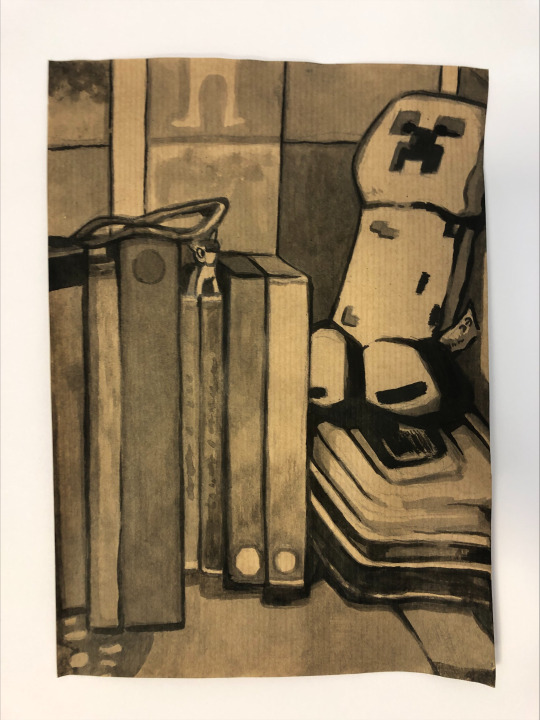


When the three were completed I took inspiration from Tuymans' mounting and glued my ink paintings onto white card to frame them. Almost giving the illusion of looking in a window.

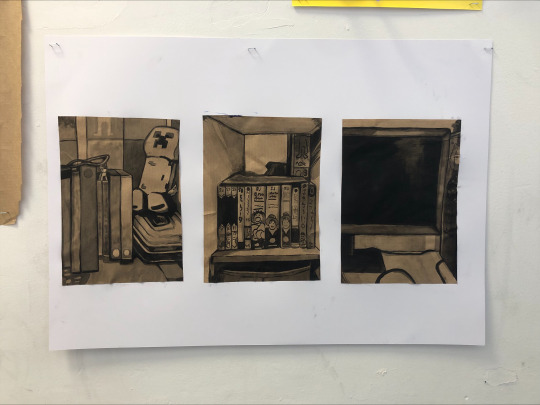
I waited till after I had presented on the 19th before I uploaded these.
#lsad#painting#indian ink#ink painting#interior painting#artist inspiration#Luc Tuymans#monochromatic art
3 notes
·
View notes
Text








I am so happy we got the day off. I really needed it. I actually felt good today and got some stuff done. It was great.
I slept until 930. I woke up briefly when James left for work. Got a kiss before they left. And went back to sleep.
When I woke up I felt good. But I also didn't feel like I needed to get up. I would just lay in bed on my phone. But after 10 I finally got up.
I was kind of cold. And my hair didn't look as nice as I hoped. Frustrating but whatever.
I got dressed and went to have cereal. It was a nice day. I didn't feel like I needed to rush to do anything. I could just have a good day.
I really wanted to make ice cream bread today. So I would have to go get self rising flour.
I got myself together and drove to the grocery store. I would find the flour pretty quick and also went to find a new wrist brace. They didn't have the same brand but I actually think I like this one better. The material is softer and it ha three points of connection rather then two. And it has gel on the palm area which is nice.The only real downside is that it's only for my one wrist, while the other one could be either hand. My right arm doesn't hurt as much though so I think it's okay for now. But hopefully it helps the pain.
I would pay and go drive around the block to Park closer to the hard ware store. I really want to support this Ace but man. They only every have half the stuff I need. Ans they don't seem to carry basically any wood except for trim.
But I got more screen material and some hinges. And for enjoyed walking around and chatting with the employees.
I left there and drove to the restore a road from the Home Depot. First time I have gone and it was a really clean one! And the staff was so nice! It was great.
I was mostly looking for a screen door. And I found one but sadly it would end up being a bit to small. But that's okay. I will probably still use it in some way. It was behind a chain and I wasn't sure if I was allowed to move the chain myself so I went and asked am employee. And when I decided to buy it the person at the front desk was so nice. She was the store manager and we talked about our cats and because she was excited about it she gave me $2 off. Amazing. We showed each other pictures of our cats and it was super cute.
I did still go to Home Depot to get more 2x2s. And they actually had the saw working! So I did not have to chop them by hand. And the worker was very nice to me. I had a lot of places to carry but I muscled it to the register and then to the car. Excellent.
I went home after that. I thought about getting lunch but I shouldn't eat out every day even though I want to. I got home and got eveything inside. Sweetp was scared of the wood again? He's always afraid of wood for some reason.
I started working on attaching hinges to the door I bought but it became clear I will have to frame it out differently. So that's a later problem. Ah well.
I switched gears to work on the door for the catio. And this went sideways because I apparently can't measure. So I had to cut the wood three times. But after like two hours I was able to make it work. I also discovered that the screws I was using worked way better with a square bit and I was so thrilled.
The lock I bought did not work so I ended up using eye screws and a carabineer to close the door but it worked!! And Sweetp was able to start exploring! I will have to make some things for him to climb on and perch in but I am really excited about how it came together.
I would finally eat some lunch. I warmed up my leftover Indian and filled a pita again and that was really good. And I started working on baking ice cream bread.
I wanted to try and make the Neapolitan with the three flavors. And I for sure should have melted the ice cream better because I struggled to mix it with the flour. But it smelled great. That would bake for 45 minutes while I got Sweetp used to going in and out of the windows. And I would do the dishes. Some had to be done by hand but that was fine.
I would also vacuum the frog tank and finally put away my printmaking workshop supplies form the weekend. Was nice to put things away.
I had some of my ice cream bread when it was done and I was feeling really good about it. Was even better with a little frosting.
I have been hanging out since then. With sweetp. Texting Celia. Waiting for James to come home. Today was opening day and they went to watch the game. Which I think went well.
Tomorrow we are back to work. And I am looking forward to it even if I would prefer to be home. It will be a good day. And then tomorrow night me and James are going to see an interactive showing of "Death Becomes Her" which I loved when I was a kid but I haven't seen in 20 years. I'm excited. I hope you all have a great night. I love you all!! Good night!!
2 notes
·
View notes